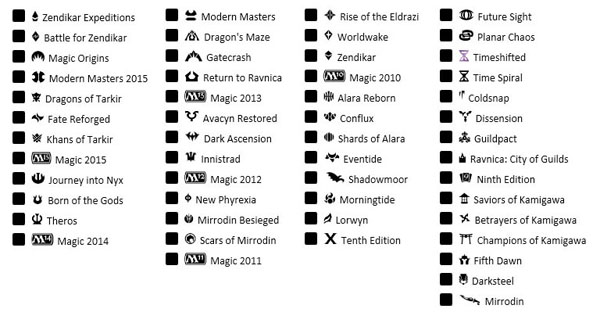

MTG CARD SETS SYMBOLS SERIES
What it says is that during each players turn, they partake in a mini game like the shopping list game you might have played as a kid you have to memorise and then add to a series of actions that continues until one player makes a mistake, at which point that player loses their entire hand of cards and the mini game ends. Normally, a card’s use is explained through a succinct piece of text written on the card itself, but this one is jokingly over explained using legal jargon. To give you an idea of exactly how much, I implore you to watch this video of a guy opening up an alpha edition of the card, which has been known to sell on eBay for over $160,000! Of course, this seemed an obvious target for mockery, this the ‘Blacker Lotus’ card was introduced in the original Un set ‘Unglued’ and parodies the original well it increases the power of the original card by giving you four mana instead of three, but in order to use it, you have to rip up the card an unthinkable act to most gamers even without the originals value! A Lot Of Explanationīureaucracy is a typical example of how these sets are not afraid to add unusual new elements to the game. So high in fact that it became the most valuable card that has ever existed in this entire game to date. It was also a rare card, meaning it would only appear in very few packs so its value was high. This card, a type of item known as an artifact, allowed you to add mana to your pool which is what you need to play cards, though this one was better than most and was particularly useful in an early game and as a result was quite sought after. To start off, I want to focus on a card that mocks one of the most well-known entities in the Magic: The Gathering series the Black Lotus. The ‘Un’ series, which began in 1998 with Unglued, continued with Unhinged in 2004 and was added to most recently in 2017 with the Unstable set, are the focus of this article, and so let’s get stuck in. The game is of course a little more complex than that, but the good news is you don’t need to know the ins and outs of it to enjoy this article I’ll explain anything you need to know as and when it comes up. Since being released in 1993, the game has released over 12,000 cards for the series hidden inside the iconic foil sachets, written in eleven languages, and has been played by over 12 million people!Īs a brief introduction for those unfamiliar with this game, you play a magical being known as a planeswalker, and you’ll play cards such as creatures and spells into the battlefield, using them to get your opponents health down to zero in order to win. Did you know that the name’s unusual suffix was added because the original name of just Magic was too broad to ever be copyright protected by law? Luckily they did then because this series is a monster. The very fact that you’re checking out this page means you’ve probably already heard of Magic: The Gathering, one of the most successful trading card games ever released that is currently celebrating its 25th Anniversary. As I already have a huge interest in Easter Eggs in games, I immediately become fascinated by the idea of the Un sets and spent time going through them, finding the very best bits and so now, I’m sharing some of my highlights from this excellent series below! A Brief Introduction A colleague of mine explained this was a spin off of sorts to the main game featuring lots of meta jokes, references to other cards and unusual mechanics, and so with my curiosity now piqued, we immediately opened up a few of the packs to find cards that looked like the Magic I knew but with a difference.

We got chatting for a bit and as he left, this guest very kindly donated a stack of booster packs to us from the latest set called Unstable. While I’d heard about the game before, even played it a couple of times thanks to my old housemate who used to collect it, I wasn’t familiar with the game’s long running past. Back in 2017, I was at work (at a gaming cafe) when one of the guests who came to visit us introduced themselves as an employee of Wizards Of The Coast, the publisher behind Magic: The Gathering.


 0 kommentar(er)
0 kommentar(er)
